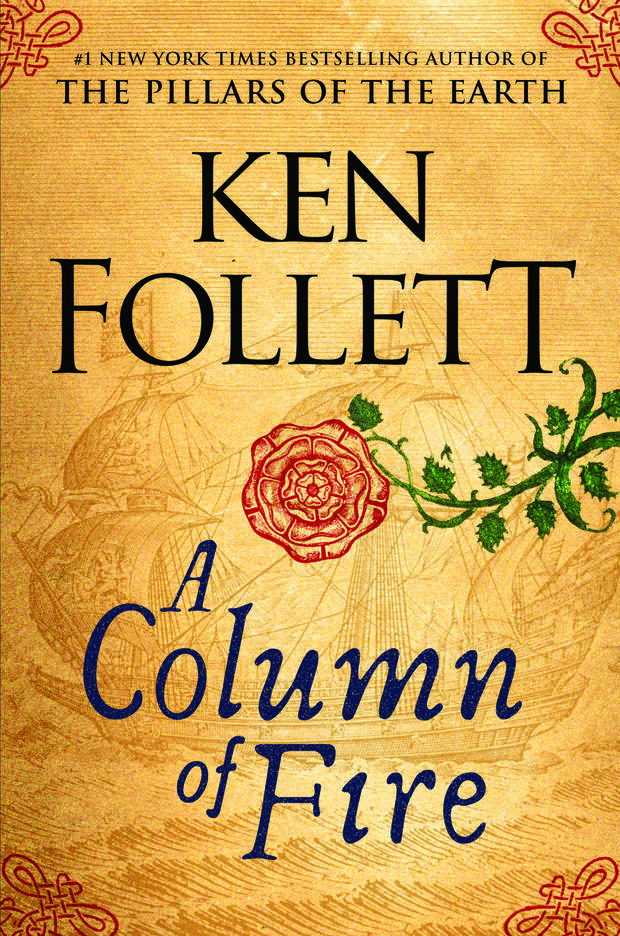Read an excerpt of Ken Follett's new book, "A Column of Fire"
Ken Follett, author of bestselling books "The Pillars of the Earth" and "World Without End," is out with his latest historical novel, "A Column of Fire." Set in 16th century Kingsbridge during the reign of Queen Elizabeth I, Follett introduces a world of secret agents and spies in a time of religious conflict.
Listen to the "CBS This Morning" Podcast for our conversation with Follett:
Here's an excerpt of "A Column of Fire":
Part One
1558
Ned Willard came home to Kingsbridge in a snowstorm.
He sailed upstream from Combe Harbour in the cabin of a slow barge loaded with cloth from Antwerp and wine from Bordeaux. When he reckoned the boat was at last nearing Kingsbridge he wrapped his French cloak more tightly around his shoulders, pulled the hood over his ears, stepped out on to the open deck, and looked ahead.
At first he was disappointed: all he could see was falling snow. But his longing for a sight of the city was like an ache, and he stared into the flurries, hoping. After a while his wish was granted, and the storm began to lift. A surprise patch of blue sky appeared. Gazing over the tops of the surrounding trees, he saw the tower of the cathedral—four hundred and five feet high, as every Kingsbridge Grammar School pupil knew. The stone angel that watched over the city from the top of the spire had snow edging her wings today, turning the tips of her feathers from dove-grey to bright white. As he looked, a momentary sunbeam struck the statue and gleamed off the snow, like a benison; then the storm closed in again and she was lost from view.
He saw nothing except trees for a while, but his imagination was full. He was about to be reunited with his mother after an absence of a year. He would not tell her how much he had missed her, for a man should be independent and self-sufficient at the age of eighteen.
But most of all he had missed Margery. He had fallen for her, with catastrophic timing, a few weeks before leaving Kingsbridge to spend a year in Calais, the English-ruled port on the north coast of France. Since childhood he had known and liked the mischievous, intelligent daughter of Sir Reginald Fitzgerald. When she grew up her impishness had taken on a new allure, so that he found himself staring at her in church, his mouth dry and his breath shallow. He had hesitated to do more than stare, for she was three years younger than he, but she knew no such inhibitions. They had kissed in the Kingsbridge graveyard, behind the concealing bulk of the tomb of Prior Philip, the monk who had commissioned the cathedral four centuries ago. There had been nothing childish about their long, passionate kiss: then she had laughed and run away.
But she kissed him again the next day. And on the evening before he left for France they admitted that they loved one another.
For the first few weeks they exchanged love letters. They had not told their parents of their feelings—it seemed too soon—so they could not write openly, but Ned confided in his older brother, Barney, who became their intermediary. Then Barney left Kingsbridge and went to Seville. Margery, too, had an older brother, Rollo; but she did not trust him the way Ned trusted Barney. And so the correspondence ended.
The lack of communication made little difference to Ned's feelings. He knew what people said about young love, and he examined himself constantly, waiting for his emotions to change; but they did not. After a few weeks in Calais, his cousin Thérèse made it clear that she adored him and was willing to do pretty much anything he liked to prove it, but Ned was hardly tempted. He reflected on this with some surprise, for he had never before passed up the chance of kissing a pretty girl with nice breasts.
However, something else was bothering him now. After rejecting Thérèse, he had felt confident that his feelings for Margery would not alter while he was away; but now he asked himself what would happen when he saw her. Would Margery in the flesh be as enchanting as she seemed in his memory? Would his love survive the reunion?
And what about her? A year was a long time for a girl of fourteen—fifteen now, of course, but still. Perhaps her feelings had faded after the letters stopped. She might have kissed someone else behind the tomb of Prior Philip. Ned would be horribly disappointed if she had become indifferent to him. And even if she still loved him, would the real Ned live up to her golden remembrance?
The storm eased again, and he saw that the barge was passing through the western suburbs of Kingsbridge. On both banks were the workshops of industries that used a lot of water: dyeing, fulling of cloth, papermaking, and meat slaughtering. Because these processes could be smelly, the west was the low-rent neighbourhood.
Ahead, Leper Island came into view. The name was old: there had been no lepers here for centuries. At the near end of the island was Caris's Hospital, founded by the nun who had saved the city during the Black Death. As the barge drew closer Ned was able to see, beyond the hospital, the graceful twin curves of Merthin's Bridge, connecting the island to the mainland north and south. The love story of Caris and Merthin was part of local legend, passed from one generation to the next around winter fireplaces.
The barge eased into a berth on the crowded waterfront. The city apparently had not altered much in a year. Places such as Kingsbridge changed only slowly, Ned supposed: cathedrals and bridges and hospitals were built to last.
From "A Column of Fire" by Ken Follett, to be published on September 12, 2017 by Viking, an imprint of Penguin Publishing Group, a division of Penguin Random House, LLC. Copyright © 2017 by Ken Follett.




